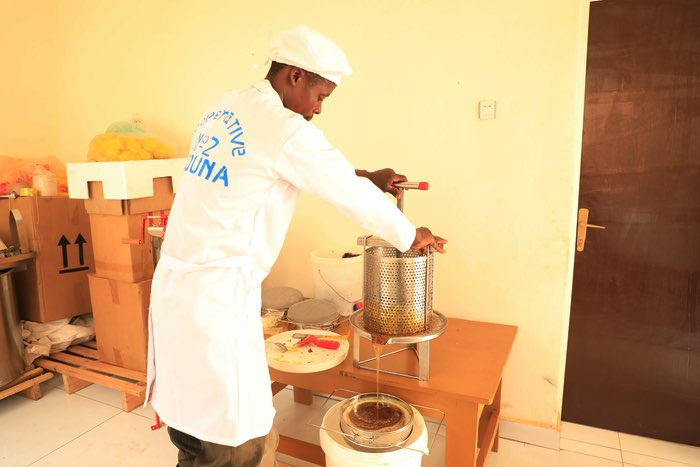
The rehabilitation of Sanza and Ibanda-Makera natural forests in Ngororero and Kirehe Districts exemplifies how ecosystem restoration can uplift communities. These forests were restored by the Rwanda Environment Management Authority (REMA) through its recently concluded project, Building Resilience of Communities Living in Degraded Forests, Savannahs, and Wetlands through an Ecosystem-Based Adaptation (EbA) Approach, also known as LDCF2.
Funded by the United Nations Environment Programme (UNEP), the project enhanced ecosystem services in both districts, delivering significant socio-economic benefits to local residents, particularly beekeepers.
Beekeepers living near Sanza Forest in Ngororero and Ibanda-Makera Forest in Kirehe are thriving, thanks to the restoration of these ecosystems. The revitalized vegetation, rich in biodiversity, has created ideal conditions for bees to thrive. As a result, honey production in these areas has surged, providing beekeepers with a reliable source of income.
“The restoration of the forest has been a blessing for us. With more flowers and a better habitat for our bees, honey production has increased significantly, transforming our livelihoods. I didn’t own any cows, goats, or even chickens because my earnings were just enough for food. As my harvests grew, I bought a pig, which reproduced, and with the income from honey production, I bought a cow and a plot of land. The cow has reproduced, and today I own more than three cows thanks to the cooperative. Now, I can go to the bank, secure a loan, and use it to buy what I need. In short, my life has completely transformed compared to what it was before,” said Ngirinshuti Jean Baptiste, a beekeeper near Sanza Forest.
Ngirinshuti is also the president of Itezimbere Muvumvu Cooperative, a beekeepers’ group operating in Sanza Forest. The cooperative comprises men and women who dedicate their efforts to beekeeping activities.
“The forest is valuable to me. It benefits us by providing a place for our bees to gather nectar. When the forest was being cut down, our bees had nowhere to forage, and there was no yield. But now, with the forest protected, our bees have a good yield and security, which we find very beneficial,” said Bahirumwe Gorette, one of the women cooperative members.
Beekeeping was traditionally considered a male activity, but the income it generates has encouraged women to participate actively. In Ibanda-Makera Forest, Babonampoze Marine was busy harvesting honey from around 10 beehives, wearing a white protective suit as hundreds of bees buzzed around her.
“First of all, when you are willing to do such a job, you must overcome your fear. Once you’ve conquered fear, you need the right equipment. A smoker with enough fire and smoke is essential. When you introduce the right amount of smoke, the bees cannot communicate to warn each other about danger, so they won’t sting you. With the right tools and mindset, everything becomes possible,” Babonampoze explained.
Before REMA’s intervention, beekeepers in Sanza and Ibanda-Makera forests practiced traditional beekeeping in the mountains. The project provided modern training and beehives, enabling them to increase production. Beneficiaries are now applying the cooperative model to start modern beekeeping independently.
“I’ve learned a lot from the cooperative. For example, I had never seen modern beehives before joining. One day, a vehicle brought us modern hives, and I carefully observed their design. I decided to invest my own money to start a personal beekeeping project similar to what the cooperative was doing. The most valuable lesson I’ve learned is managing modern beehives. Once I secure funds and a suitable location, I’ll hire a carpenter to make modern hives for me. This way, I can operate independently while remaining part of the cooperative,” said Antoine Nsanzumuhire, a member of Itezimbere Muvumvu Cooperative.
Honey, a highly sought-after product, is boosting household incomes and creating opportunities for local markets to expand. The flourishing beekeeping activities highlight the direct link between healthy ecosystems and sustainable livelihoods.
Building Resilience in Kirehe’s Drought-Prone Communities
In addition to supporting beekeeping, the LDCF2 Project addressed climate change challenges, particularly in the drought-prone Eastern Province. Beneficiaries in Kirehe District received water harvesting tanks, irrigation technologies in Kayonza and Bugesera Districts, and training in climate-smart agriculture. These interventions have empowered communities to cope with prolonged dry spells while maintaining food security.
The project also rehabilitated Mulago Wetland in Bugesera District and lakes such as Cyohoha and Kibare in Bugesera and Kayonza, respectively, boosting fish production.
The restoration of Sanza and Ibanda-Makera forests has led to improved biodiversity, soil conservation, and water regulation. These ecosystem services not only support livelihoods like beekeeping but also play a crucial role in mitigating climate change impacts.
REMA notes that this transformative project demonstrated how addressing climate challenges can profoundly change lives. By restoring degraded forests, lakes, and wetlands, and providing innovative solutions like water harvesting tanks and irrigation technologies, the project enhanced both the environment and livelihoods. (End)
